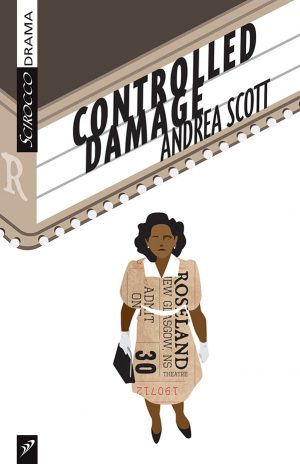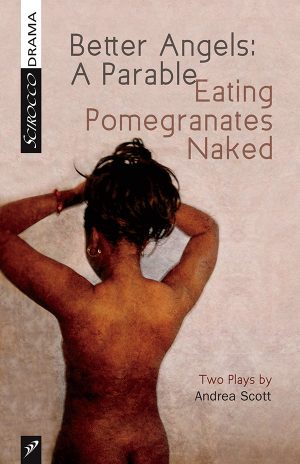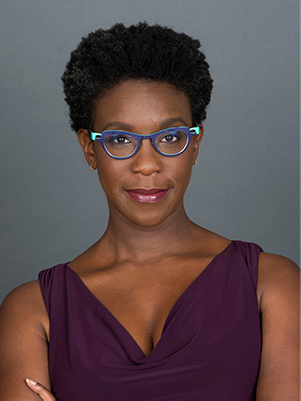Posted May 14, 2021
The Interview – Andrea Scott
Andrea Scott
Andrea Scott is a Toronto playwright and screenwriter. Her play Controlled Damage (Scirocco Drama 2020,) about civil rights icon Viola Desmond, had a sold-out run at Neptune Theatre (in association with bcurrent) in February of 2020. Andrea is also the author of Eating Pomegranates Naked and Better Angels: A Parable (Scirocco Drama 2018) and the co-author (with Nick Green) of Every Day She Rose. Andrea is the recipient of the Cayle Chernin Award for Theatre, the Magee TV Diverse Screenwriting Award, and she recently received funding to develop an original pitch for Amazon Prime Video.
What do you like best about playwriting?
I enjoy the world-building of the individual characters. I spend a very long time creating their backstories and how they may intersect with one another. The language each person uses is also quite important and I find myself listening to how real people communicate and attempting to fuse certain verbal quirks to my characters. Now that we’ve been in a pandemic for over fourteen months, it’s been impossible to listen to strangers in coffee shops, so I consume a lot of podcasts that have two hosts and/or guests. My favourites are “Pod Save America,” “Keep It,” and “This American Life” for varying styles of speaking and rhythms.
When you look at your body of work, do you see any recurring themes or subjects? If so, what are they, and why do you think you revisit them?
It was a friend who saw the repeated theme: identity. Self-perception of one’s identity and expectations based on societal norms and the status quo come up repeatedly in the fourteen plays that I’ve written. I now know that the reason I return to this theme is that it’s a question I struggle with every day as a Black woman who works in a creative field. The perception of who I am supposed to be in this world/industry, based on pre-conceived ideas of race and gender, and who I actually am is always in conflict. I know there is no rule book that I’m supposed to follow but perception is reality these days and I’m hyper-aware of being watched by my peers and strangers who wish to categorize me. A lot of people understand this feeling of being an outsider and as a result, they relate to my plays.
Who or what do you count among your inspirations and influences?
As a playwright I was heavily influenced by Ntozake Shange, Alice Walker, and Toni Morrison because of the musicality and poetry in their words and their unapologetic approach to portraying Black female anger. Tony Kushner and David Hare thrill me because they write through the “personal is political” lens without preaching and both construct gorgeously complex, flawed characters. I fell into an August Wilson hole last year, and working through his plays has felt like an education from a like-minded creator. He didn’t study playwriting in school, he just wrote, failed, learned from his mistakes, and kept writing; it teaches me that there’s no absolute formula to creating great plays.
This may be hard to think about during the pandemic, but can you describe one of your favourite nights in the theatre – either at one of your own plays or at someone else’s?
I can name two: I was blown away by a production of Scorched by Wajdi Mouawad at Tarragon Theatre in 2007. It was an evening where I saw the perfect intersection of character, plot, pacing, pathos, acting, and history-based storytelling — and felt transported. It’s not possible to forget such an incredible example of creative excellence in theatre. The second experience was at Theatre Passe Muraille when I watched Bahia Watson and Liza Paul in Pomme is French for Apple. I’ve never laughed that much at the theatre and felt so strongly that the artists onstage were relatable human beings. (It’s written from the West Indian perspective, and I’m of Jamaican descent.) It was also when I watched Bahia and thought, “She’s going to be a star.”
What is the best piece of writing advice you’ve ever been given?
Don’t stop writing, even if it seems like nobody appreciates your work; people are noticing, trust me. From Bob White and Joanna Falck, on two separate occasions, when I was ready to quit and try to get a job at Google.
Can you tell us a little bit about what you’re working on now?
There will be a reading of my newest play, What’s Your Deal? at ATP this month and I am currently working on Murdoch Mysteries as they begin Season 15.
Books by Andrea Scott
-
 Controlled Damage$9.99 – $15.95
Controlled Damage$9.99 – $15.95 -
 Better Angels: A Parable and Eating Pomegranates Naked$9.99 – $15.95
Better Angels: A Parable and Eating Pomegranates Naked$9.99 – $15.95

